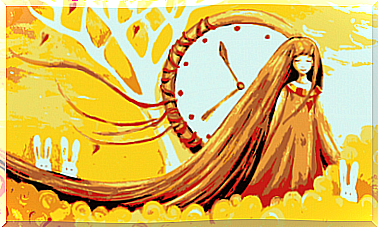I Don’t Tire Of Offering Love, Disappointments Tire Me

We are all a bit fragmented. We carry our broken pieces trying to piece together the impossible puzzle of our hearts, yearning to offer love once more. We want to love and be loved, however, disappointments already burn too much …
It is often said that whenever we are willing to do everything for others, we must be prepared that at some point, we are disappointed. In some way, it is as if the pain is implicit when we speak of affections, of love, of affection. Now this is not entirely true.
Our emotional and social brains crave the security of a secure bond. Security ultimately guarantees our survival, and this explains why we feel pain when we are disappointed. Something inside us breaks, breaks. The secure link disappears and only emptiness remains.
It is possible that sometimes we build too high expectations towards something or someone. It may be, but we all need certain guarantees that we will not be hurt. That those of us who choose to offer love do not have to disappoint or break that bond just like that.
No matter how much they tell us, no one is prepared to take disappointment as “normative” in our everyday relationships.
Offer love despite sadness and pain

We are used to being told that disappointments are not caused by inappropriate behavior, but by false expectations that you have about things. Now, this phrase from the manual does not make sense in some cases, especially when the behavior has been really cruel, unexpected and painful.
When one has a good friendship with someone, it is not within their expectations that they criticize us behind our backs. When a person reaches old age, it is not in his expectations that his children abandon him. When you love and believe you are loved, you never expect to be mistreated or humiliated by your partner.
There are real, deep and stark disappointments. Offering love after these life experiences is little more than mission impossible, because we need time. We need the needles of time to sew and mend wounds, “broken pieces” that our brains, believe it or not, interpret as such. Like real wounds.
A real pain
According to a study published in the journal “Proceedings of the National Academy of Sciences” and carried out by the emotional psychologist Ethan Kross, both rejections, betrayals and deep disappointments are interpreted by our brain as a blow, a burn or a traumatic physical impact.
The brain region that is most activated in these cases is the insula, directly linked to pain. All this shows us that for the brain, a disappointment is the breaking of a thread that offered us security, confidence in something or someone that has now vanished.
Offering love again after these experiences is not easy, however, it can be a good medicine to heal wounds.
A disappointment, in addition to suffering, causes us to feel vulnerable. When a person feels fragile, more than offering love what they need is to receive it, receive it especially from themselves to rebuild themselves, to validate themselves again with all their integrity, strengths and self-esteem. Something that gives us time and adequate inner work.
- In addition to the time factor, we will have to manage three basic feelings: anger, pessimism and helplessness. A disappointment uproots our roots and makes us think that nothing is going to be the same. Dispel these three horsemen of unhappiness from your heart as soon as possible.
- Assume, on the one hand, that you did not deserve what happened to you, but also accept that you do not deserve to suffer eternally. Do not choose resentment as daily food, do not prescribe suffering as eternal medicine, the side effects are devastating.
Better remember something essential: choose you. To you above all things, above fears, uncertainties and resentments.
Choose to get excited again and above all, to continue cultivating what is really worthwhile: offering love. Think that despite all the disappointments, there are still good people.









